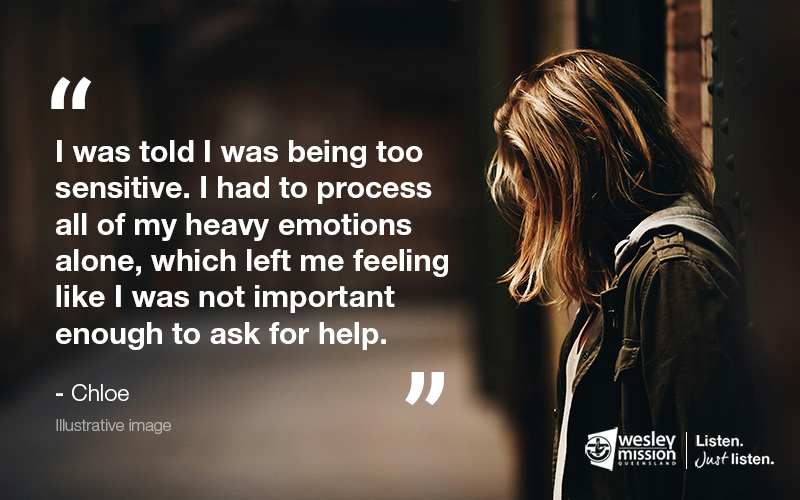Chloe's story. A response to increased suicidal thoughts in children under 12

Chloe, now 21 years old, struggled with mental health issues as a child. In a chat with Wesley Mission Queensland (WMQ), she explained that her feelings were often dismissed and overlooked.
I was told that I had no real reason to be distressed, and that I was being too sensitive.
Chloe shares her story as part of WMQ's Just Listen campaign, a response to data showing that:
- 50% of all mental health conditions start before the age of 14;
- An increasing number of children under 12 years old are disclosing thoughts of suicide (recent findings from WMQ’s various mental health services).
Just Listen
emphasises the simple yet powerful act of listening to support children experiencing high levels of distress.
Chloe's testimonial - What I wish my parents knew
Chloe, 21 years old, headspace customer
As a child, my feelings were often dismissed and overlooked. I was told that I had no ‘real’ reason to be distressed, and that I was just being too sensitive. Although it was not my parent’s intention, I learnt that I had to process all of my heavy emotions alone, which left me feeling like I was not important enough to ask for help.
This resulted in an array of emotional wellbeing challenges throughout adolescence, that followed me into adulthood. I am now 21 years old; this is what I wish my parents knew. I know that parents just want to help but I never needed my parents to tell me how to ‘fix it’ or how to feel, when I didn’t feel ok.
Early on, my distress looked like lots of crying and being overwhelmed. Distress can also be internalised and appear in other ways – somatic (physical) symptoms like chronic headaches, fatigue, stomach and muscle pains were very common.
Distress also looked like having high expectations of myself; over-apologising for every mistake and not thinking that anything I did was good enough. I wish someone was able to give me space to talk about my feelings, to feel supported after a bad day, or even just to tell me that my feelings mattered.
Having someone listen, just listen, would have given me the space to process my feelings and to feel heard. It also would have allowed me to practice sitting with, and working through, troubling emotions, rather than just hold them all in.
This is important as it allows us to learn how to effectively regulate emotions and develop crucial interpersonal communication skills. Genetically, I was predisposed to need support in managing my emotions and cognitions, but I believe that although I was always going to have struggles, if I had felt more heard I wouldn’t have had to struggle as much as I did.
My parents often used to ask what I wanted them to do to ‘fix things’; now as an adult I can finally offer some suggestions:
1. Just listen; you don’t need to fix it.
- It is ok not to have all the answers! Sitting with children in distress and together tolerating the discomfort of not knowing what to do, can reassure them that they are safe and able to make it through the distress.
2. Ask questions unconditionally. Stop, listen and focus on how your child responds.
- Even if it takes more attention or time than you anticipated, it’s so important to make sure your child’s response feels heard. Even a small question like How was your day or how are you feeling, can open up a conversation. It’s not enough to just ask the question, you have to show that you really care about the answer.
3. Don’t stop trying.
- It can be so hard for parents to see their child in distress but by just being there for them you really are making a difference.
This is more than a campaign. This is a call to action. Be alert to your child’s feelings. Their feelings are valid and real to them. You can help them by listening. Please listen. Just Listen.
– Emma Ashe, WMQ's General Manager, Mental Health Services
